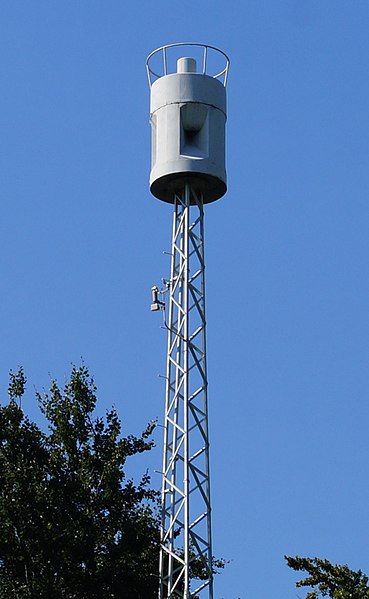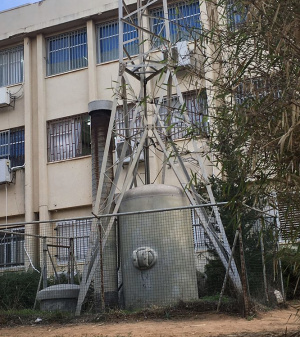HÖRMANN HLS: Difference between revisions
No edit summary |
No edit summary |
||
| Line 7: | Line 7: | ||
|hertz = 400 - 530 | |hertz = 400 - 530 | ||
}} | }} | ||
The HLS F-71 is a pneumatic siren manufactured by Hormann gmbH. It was an improved design of the Pinsch Bamag and Rickmers Werft models. These sirens have a diesel engine that drove an air compressor and generator. The air compressor fills up a 6,000 liter air tank up bellow the sirens tower ,and the generator charged up the accumulators for power. Air is then piped up to the head that has a cast aluminum disc rotor with 4 slots in it powered by a 48 volt motor. These sirens actually had speed control of some sort on the chopper motor which is why they have such a linear wind up. Battery voltage would only affect how fast the chopper would ramp up. Most of them tended to be somewhere in the 400 Hz | The HLS F-71 is a pneumatic siren manufactured by Hormann gmbH. It was an improved design of the Pinsch Bamag and Rickmers Werft models. These sirens have a diesel engine that drove an air compressor and generator. The air compressor fills up a 6,000 liter air tank up bellow the sirens tower ,and the generator charged up the accumulators for power. Air is then piped up to the head that has a cast aluminum disc rotor with 4 slots in it powered by a 48 volt motor. These sirens actually had speed control of some sort on the chopper motor which is why they have such a linear wind up. Battery voltage would only affect how fast the chopper would ramp up. Most of them tended to be somewhere in the 400 Hz to 420 Hz area so long as the batteries are in good condition ,but some can peak as high as 530 Hz. If the voltage falls too far below 24 VDC it would have slow wind ups and peak lower than normal just like any typical DC powered siren. When that speed controller or whatever it is gives up the ghost, the chopper will spin up and run at any pitch. There are currently no active F-71s. Germany has decommissioned theirs since the 1990s or early 2000s. And Israel has decommissioned theirs in 2010. Many in Germany have had their heads removed and use their tower to support radio antennas or replaced with a Hormann ECN ,some are sitting abandoned ,and others have been removed. In Israel ,all of theirs are still standing but inactive ,and have been replaced with ATI HPSS-32s in 2010. | ||
[[File:B2ADFADF-CAFB-4A68-8219-6D2EB750CCDE.jpeg|thumbnail|Base of the F-71 tower showing the engine ,generator ,and accumulator room bunker hatch ,engine exhaust pipe ,and air tank with air relief valve on the side.]] | [[File:B2ADFADF-CAFB-4A68-8219-6D2EB750CCDE.jpeg|thumbnail|Base of the F-71 tower showing the engine ,generator ,and accumulator room bunker hatch ,engine exhaust pipe ,and air tank with air relief valve on the side.]] | ||
Revision as of 22:07, 9 May 2019
| HÖRMANN HLS | |
[[File: |200px]] |200px]]
| |
| Company | Hormann |
|---|---|
| Produced | late 1960s-1970s? |
| Type | Pneumatic |
| Sound output | 132 |
The HLS F-71 is a pneumatic siren manufactured by Hormann gmbH. It was an improved design of the Pinsch Bamag and Rickmers Werft models. These sirens have a diesel engine that drove an air compressor and generator. The air compressor fills up a 6,000 liter air tank up bellow the sirens tower ,and the generator charged up the accumulators for power. Air is then piped up to the head that has a cast aluminum disc rotor with 4 slots in it powered by a 48 volt motor. These sirens actually had speed control of some sort on the chopper motor which is why they have such a linear wind up. Battery voltage would only affect how fast the chopper would ramp up. Most of them tended to be somewhere in the 400 Hz to 420 Hz area so long as the batteries are in good condition ,but some can peak as high as 530 Hz. If the voltage falls too far below 24 VDC it would have slow wind ups and peak lower than normal just like any typical DC powered siren. When that speed controller or whatever it is gives up the ghost, the chopper will spin up and run at any pitch. There are currently no active F-71s. Germany has decommissioned theirs since the 1990s or early 2000s. And Israel has decommissioned theirs in 2010. Many in Germany have had their heads removed and use their tower to support radio antennas or replaced with a Hormann ECN ,some are sitting abandoned ,and others have been removed. In Israel ,all of theirs are still standing but inactive ,and have been replaced with ATI HPSS-32s in 2010.
